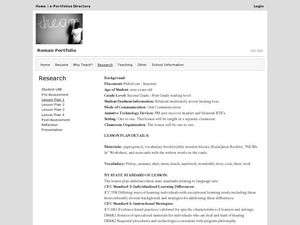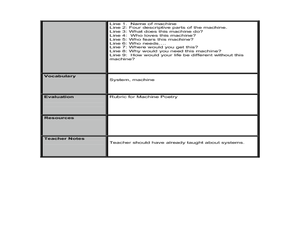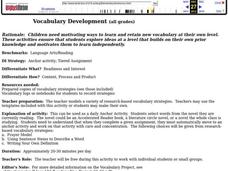Curated OER
Write the Question
In this ESL food vocabulary worksheet, students examine 7 pictures of food. Students read the sentence and write a question that will go with it.
Curated OER
P a g e - b y - P a g e
Middle schoolers discuss the writing process and take notes on the five steps and how they can be used in other subjects. They examine a newspaper article and after reading it they identify the five W's and H. They brainstorm to come...
Curated OER
Walking With Thoreau
Students engage in a series of activities geared towards studying the author Henry David Thoreau. They use different sources to obtain information to create context for future lessons. Students attempt to model their own lives to that of...
Curated OER
Build an Ice Cap
Students research Earth science by conducting an experiment in class. In this ice-cap lesson, students identify what an ice cap is and create a biome using a box which measures 1 ft. x 1 ft. Students participate in an animal role-playing...
Curated OER
Build the Arctic Tundra
Young scholars build a model of biome in order to comprehend the abiotic and biotic factors that are prevalent in a biome. In this hands on building lesson, students use a box to build a biome. . Young scholars decorate the...
Curated OER
Love Your Neighbors Like Yourself (Private-Religious)
Students role play. For this service lesson, students brainstorm what it means to love their neighbor as themselves. Students discuss why it is important to help others and role play scenarios where they volunteer to help someone in need.
Curated OER
Communication 5: Defending Your Rights
Students role play situations where they communicate and defend themselves. In this communication lesson plan, students defend their rights by being assertive.
Curated OER
Editing
Fourth graders edit their previously written essay rough drafts with a partner in this lesson. They apply the revision process using a revision checklist, then revise independently. They conference with the teacher about their needed...
Curated OER
Don't Forget to Say Thanks
Students practice descriptive writing in a thank-you note format. In this descriptive writing activity, students read the example letter and analyze the corrections in the letter. Students read the example thank you notes and focus on...
Curated OER
Cell Organelles
Students explore biology by researching living cells. In this living organism lesson, students participate in a role-playing activity in which all the students in class form one plant cell by portraying specific parts of a cell. Students...
Curated OER
Fill Me In
Second graders work on expanding their vocabulary. In this personal writing lesson, 2nd graders practice word identification and complete a worksheet by filling in the blanks.
Curated OER
Media Analysis--Culture and Gender Roles
Ninth graders participate in class discussion about culture and how it influences our lives then complete an analysis of advertisements from popular magazines to derive what effects they have on our culture. They use analysis of adds to...
Novelinks
Count of Monte Cristo: Unsent Letters
To demonstrate their understanding of the relationships in Alexandre Dumas' The Count of Monte Cristo, readers are asked to assume the voice of one of the characters and draft a letter addressing another individual in the story.
Curated OER
Machine Poetry
Fourth graders write poems describing the relationship of machine parts. In this poetry writing lesson, 4th graders review a system and examples. Students discuss the systems individual parts and how they work. Students use the given...
Anti-Defamation League
Harriet Tubman on the $20 Bill: The Power of Symbols
How important are symbols and symbolic gestures in society? Middle schoolers have an opportunity to analyze the importance of symbols on American currency with a lesson that investigates the controversies surrounding redesigning the $5,...
Curated OER
My Family and Our Nationality
After completing the activities included here, your beginning foreign language speakers will be able to name family members, identify a family's place of origin, and write short sentences about family members. They start by listening to...
Curated OER
Vocabulary Development
Learners utilize various vocabulary strategies. They use vocabulary logs to record strategies they have been taught, such as the Frayer Model (definition, picture, examples, non-examples), writing their own definitions, and using...
Curated OER
Families and Communities
Here is a week-long lesson on the roles of family members designed for first graders. In it, learners share stories of their families, listen to books about families read to them by their teacher, complete homework assignments and...
Curated OER
Like Water for Chocolate: Family Tradition
Engage young writers in family tradition with this writing assignment for Like Water for Chocolate, by Laura Esquivel. Using sensory details, learners write a narrative about a family tradition involving food. Scholars also talk with...
Curated OER
Hippocratic Medical Rounds
A very interesting way to model Hippocrates allows your clas to to compare world views and to illustrate how ideas have changed at key times throughout the history of science. This simulation has pupils role play patients and physicians.
Curated OER
Rocks and Minerals
First graders examine different types of rocks and minerals. They create models of the rocks and minerals they find interesting. They discuss and explain three ways in which the earth changes.
BBC
Local Democracy
Expanding our learners' understanding of government at a local level is a great way to build an understanding of government at a global level. Start the understanding by using any of these fun teaching ideas. Learners engage in several...
Curated OER
Sybil Ludington's Ride - a poem
Fourth graders examine the role a teen from the Hudson Valley played in the American Revolution. They view the map of Sybil's ride and calculate the distance using the map's legend.
Scholastic
Ask the Author
Here is a quick activity that could help your kids with their reading comprehension. They practice a classic strategy that gets them to start asking questions about what they are reading, while they are reading it. They write out...























